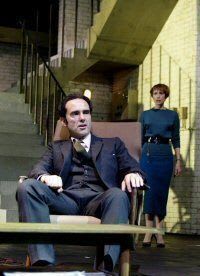The Hothouse took 22 years to make it from the pen to the stage. Written in 1958 just before The Caretaker, by the time that it appeared in 1980, initially at Hampstead, it showed many traits that were by then trademarks of this singular playwright's work.
In Ian Rickson's revival, the drama plays out on a big, wide set with hidden depths, representing a government-sponsored "care home" with research affiliations, that is more like an asylum.
Hildegard Bechtler's ambitious design is fronted by a room that doubles as the boss's office, stage left, and a staff common room to the right. The cold, terrifying nature of the institution is made apparent when its bowels are revealed to show a building looking as much like a prison as a "care home".
As one expects with Pinter, what goes on in this building one Christmas Day soon becomes Black Comedy, later veering into terror, with allegorical overtones of a Nazi totalitarian state.
The early sallies feature a whimsical old buffer, Colonel Roote played by Stephen Moore, who runs the place far from efficiently. The steely management is provided by Finbar Lynch's Gibbs and his well-named alter ego, Lush. Paul Ritter makes a great success of the latter role, at one point getting spontaneous applause for a long, breathless, comic but largely meaningless speech.
The institution is in trouble as two patients, identified only by number, have stepped out of line. One has become pregnant by an unnamed staff member and the other has inconveniently died. Much of the two and a half hours is spent investigating these mysteries until a scapegoat, Leo Bill's Lamb, can be tortured into submission.
A separate strand sees Lia Williams, perfectly cast as Miss Cutts, seductively tantalising both Roote and Gibbs (and probably a fair few members of the audience). She reaches her sexy peak as Moore excellently delivers a Christmas speech heavily influenced by the style and subject matter still favoured today by our own dear Queen.
What had seemed a largely meaningless comedy of manners then suddenly becomes ineffably terrifying as, behind a curtain onto which a Rothko red line is projected, slaughter is audibly played out. From there we move on to a brightly-lit expository scene in which the Minister behind the establishment congratulates Gibbs on his survival and an analysis of events that probably covers the latter's own involvement
In some ways, The Hothouse can be seen as an experiment in which Pinter began to explore the themes and characterisations that eventually won him a Nobel Prize and regular suggestions that he is our greatest playwright, at least of the last century. It also works on its own account as a dark, mysterious comedy about thought control and state terror.
